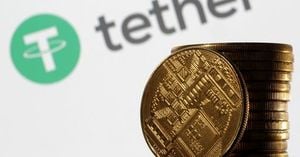Far-right commentator Candace Owens has been banned from entering New Zealand, following her being denied entry to Australia just weeks earlier. The New Zealand immigration authorities cited her previous ban from Australia as the reason for rejecting her visa application.
According to reports, Owens was poised to begin her speaking tour across New Zealand when her visa application was turned down. The immigration authority stated, "Under section 15(1)(f) of the Immigration Act, an individual may not be granted a visa to come to New Zealand if they have been excluded from another country." This follows her exclusion from Australia, where officials noted her potential to provoke social discord.
Owens made headlines recently for her controversial comments, which have been labeled by critics as downplaying the Holocaust and inciting racial tensions. Specifically, Australia’s Immigration Minister Tony Burke mentioned incidents where Owens referred to Holocaust experiments carried out by Nazi doctors as “bizarre propaganda.” He noted her potential to “incite discord” with her statements.
Previously, Owens had been due to speak across several Australian cities, but her tour was abruptly halted when she was barred from entering the country. Despite the ban, tickets for her events remained available online, indicating the potential for her appearances once the visa issues are resolved.
This isn't the first time Owens has attracted controversy. Her comments have stirred significant backlash over the years, especially around sensitive topics related to race and historical events. Most recently, Owens has criticized elements of the Jewish community, alleging they misuse their identity for personal gain and perpetuate unfair criticisms against her. These statements have deepened divides and drawn ire from various groups, particularly those focused on combating antisemitism.
More than just her views on contentious social issues, Owens has leveraged her platform across social media, garnering millions of followers and making her one of the leading voices within conservative circles. Yet, her style and opinions often come at the cost of heightened scrutiny.
Owens initially gained notoriety as a prominent voice for conservatives, advocating for stances counter to politically correct narratives. She served as the director of urban engagement for Turning Point USA, launched the Blexit movement encouraging Black voters to leave the Democratic Party, and has hosted numerous high-profile guests on her platforms, including Donald Trump and Ben Shapiro.
The tumultuous relations between Owens and Shapiro, among other influencers, illuminate her controversial position within the conservative movement. After sparring with Shapiro over the wartime actions involving Israel and the recent conflicts impacting the Middle East, Owens faced significant backlash. Shapiro has been vocal about his support for Israel, contrasting with Owens’ critiques of the Israeli government.
Her assertion during a livestream where she remarked, "You cannot serve both G-d and money" was interpreted as directed at Shapiro, echoing her sentiments about how religious and political matters intersect.
A representative from the Holocaust Centre of New Zealand had previously requested caution when considering Owens’ visa application, reflecting growing concern over her statements around historical atrocities.
Long seen as divisive, Owens’ remarks have created extensive debate not only within her follower base but also among critics who aim to counter what they see as harmful rhetoric. Her claims have included unfounded accusations against Jewish communities and have led some to label her comments antisemitic.
Overall, the bans from both Australia and New Zealand reflect broader tensions and the increasing scrutiny surrounding individuals who perpetuate controversial views. The immigration decisions have raised questions about national security and public order, with immigration officials indicating they would review her history of comments as part of their assessments.
Despite facing significant obstacles due to these bans, Owens continues to market her events, portraying them as opportunities for intellectual engagement. "Get ready to experience firsthand the intellect and fearlessness, which has captivated millions around the globe,” her promotional material claims, even as the reality of her travel plans remains uncertain.
The vigour of this saga reflects not just on Owens but poses significant questions about freedom of speech, immigration policies related to controversial speakers, and the societal impacts of employing such aggressive rhetoric. Whether her views will prompt changes to immigration laws remains to be seen, but for now, Candace Owens finds herself on the sidelines of New Zealand and Australia, waiting for her chance to reconnect with her audience and voice her perspectives.



